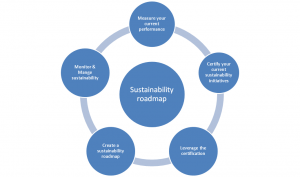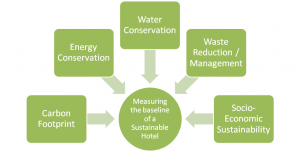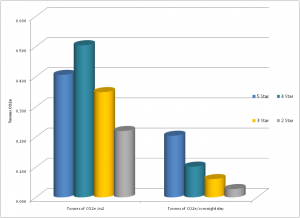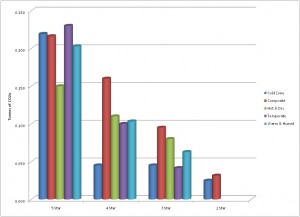A sustainability guide for the hospitality sector in India
This article is a simple “sustainability guide for the hospitality sector in India”. It will give an overview of the methods that can be taken by a hotel to chart a performance based sustainable growth path.
While a lot of hotels are taking positive measures to become environmentally friendly most of them are ad-hoc steps undertaken without any long term plan and data to substantiate the investment thus preventing hotels from being able to fully leverage their benefits. The main objective of these exercises is to be visible to the customers and project themselves as a green brand. This has led to “greenwashing” becoming a norm in the industry. Greenwashing can be defined as “The act of misleading consumers regarding the environmental practices of a company or the environmental benefits of a product or service”. The trap of greenwashing may enable firms to get short term returns on small investments but with a constant evolution of the knowledge base among customers, it compromises the integrity and the long term sustainability of the brand
Over time, green practices in the hospitality industry will become a baseline requirement, HCMI stands for Hotel Carbon Measurement initiative and is an effort to unite the hotel industry in order to calculate and communicate carbon emissions from guest rooms and meeting space in a uniform way. It is a simple method, available free of cost and a great starting point for any hotel looking to wet its toes on the path towards sustainability. It was developed by industry, for industry and will help customers especially corporate customers get accurate and consistent carbon footprint information from hotels globally. It is being pioneered by The International Tourism Partnership, World Travel & Tourism Council and 23 global hotel companies including well know ones such as Hyatt, Marriott, Hilton etc. It requires hotels to report emissions from only three key sectors which make up a bulk of the emissions namely: Fuel, Electricity and Outsourced Laundry. This will enable conscious individuals and companies to compare the basic sustainability of hotels globally and make informed decisions on how to spend their money; particularly as the cost of non-renewable energy continues to rise, regulatory pressure increases, and consumers become more demanding. Therefore, hotels with business models that revolve around green practices will have the strongest opportunity to achieve a competitive advantage by being ahead of the emerging sustainability curve. It would need hotels to move from a standard practice of proclaiming sustainability through words to a holistic approach that quantifies and certifies the operational performance of the hotel. As expected the international hospitality industry has taken the lead on this front. While doing so they have realized the benefits of these steps not only as a tool to better their image but one that also has a significant effect on their efficiency and as a result on their bottom line. This has resulted in the laggards in the industry having to pay dearly by spending large amounts of money to retrofit their hotels just to be competitive.
With the investment in India’s travel and tourism sector expected to grow at 8.8 % to INR 2,827.5 billion (US$ 63.7 billion) until 2021 there is a huge opportunity for hotels in India to learn from the industry around the world and invest early in a performance based system of sustainability that will help the hotel continuously improve its efficiency and performance.
The biggest challenge for the sector is that it is fragmented with the exception of a few big players. The smaller hotels are unable to visualize the larger impact of their activities. With limited knowledge and capability to invest in technological interventions it is absolutely necessary for them to accurately calculate the cost and resultant savings of various interventions so as to maximize their ROI. It is also equally important for these hotels to be able to accurately calculate and convey the savings and benefits to potential customers in a quantitative and qualitative manner to enable them to make informed decisions.
With a vision of enabling all: small & medium to large chain hotels across the country to undertake a wholesome approach to sustainability in a cost effective manner, outlined below is a realm of strategic steps that a hotel can take to put itself on the path to sustainable low carbon development.
Measure your current performance: This is a process of defining the baseline for your hotel. It will help you see where you are currently placed and accordingly set goals. This does not require a hotel to have taken significant steps towards becoming sustainable. There are several frameworks that help you measure your baseline such as HCMI and The Green Signal Ecolabel.
green signal <Sustainability guide for the hospitality sector in India>
Hotels looking to get deeper into the realm of sustainability there is the Green Signal ecolabel which not only enables a hotel to measure its carbon footprint but also helps it measure sustainability parameters in energy conservation, water conservation, waste reduction and Social economic involvement. The method for measuring the carbon footprint of a hotel is also far more rigorous and includes parameters in Fuel, Electricity, Outsourced Laundry, Water, Waste Water, Corporate travel & F&B. This enables an organization to view its sustainability not only from the perspective of carbon but also from other key parameters like water and waste. Such a holistic study of a hotels sustainability enables it to prioritize areas of focus and set specific targets for improvement.
Certify your sustainability initiatives:. A common way of certification around the world has been in the form of ecolabels or other similar certifications from independent third parties. There exist in India quite a few certifications like LEED, GRIHA, IGBC etc for new development projects as well as a few international ecolabels especially for hotels. These standards are helpful to some extent but they fall short of providing a holistic solution to organizations as they are static, intent and compliance based rather than performance based. These methods advise you on what targets are to be achieved but do not help you select the appropriate interventions specifically for your project that will help you achieve those targets in a cost effective manner. A simple compliance system is not sufficient to accurately measure and convey the savings and the effect of the efficiency and conservation measures undertaken for the project to potential customers. The Green Signal Ecolabel while also providing a framework for sustainability measurement certifies applicants not only based on pre-specified targets but also on their relative performance to their peers in the sector. This is done by benchmarking the performance to specific peers who fall in the same sub groups such as hotel type, agro climatic zone and service grade. This encourages hotels to continually strive for improvement and keep pace with competitors, which improves the overall market stock. A survey conducted by BEE in partnership with USAID the results of which are shown below tells us that an average 5 star hotel can save between Rs.1-5 cr/year and abate between 500 to 5000 tonnes of CO2e/year depending on the agro climatic zone and size if it improves its energy efficiency to be in the Top 25% percentile.
Leverage the certification: After certification, hotels can take advantage of the credibility to reach out to current and potential customers and project themselves as a brand on the path towards sustainability. This includes branding all publicity collateral with the ecolabel, publishing a sustainability report, getting featured and listed on eco friendly travel portals frequented by conscious tourists. Hotels can also get innovative by initiatives such as conveying key performance data to guests in a non invasive manner at the appropriate point of contact such as ‘Our sensor taps save 3500l/year equivalent to 5% of our total water consumption shown in restrooms’, or using department specific data for staff training and internal goal setting. They can also go the extra mile and offer certified carbon neutral holidays to their guests.
Create a sustainability roadmap: Once a hotel has measured its baseline, taken some steps towards sustainability and gotten themselves certified they can opt for a in-depth analysis which will help them chart a short, medium and long term sustainability plan for their organization. Energy, Waste and Water audits can be carried out to assess resource intensive hot spots and deep opportunities for savings that can be harnessed by using eco-friendly alternatives for key products along with appropriate staff training. Innovative tools such as Marginal Green House Gases(GHG) Abatement Cost Curve (MACC) modelling can help prioritize green investments based on growth and investment patterns. MACC analysis is designed to discover the most cost-effective means of mitigating climate change impact by identifying the low-hanging fruit alternatives that must be pursued before embarking upon token or capital-intensive programs. MACC will help maximize tonnes of co2e abated for every Rs. spend and can be hotel or hotel chain specific or even community specific.
Monitor and manage sustainability: Once the opportunities have been identified and targets have been set a hotel will need to track its progress towards these goals. This can be done by empowering an individual or team within the organization to be the champions for change who will monitor and track progress. Cloud based carbon footprinting tools such as Footprint Reporter powered by an India specific emission factor database can also be effective methods to track sustainability projects and automatically generate statistics and reports which can help an organization effectively monitor its progress.
Each of these topics will be taken up in detail in the subsequent editions of this article.
In conclusion it is imperative for the hospitality industry to quickly realize that with increasing choice tourists are getting more discerning and environmentally conscious and are looking for brands with credible differentiators. Despite first-time guests basing their decisions on location, amenities and service, inclusive but non-intrusive sustainability initiatives have been shown to create positive perceptions in guests resulting in a higher recall rate. This results in increased customer loyalty as well as higher brand value of the hotel. To keep attracting tourists especially foreign tourists whose numbers are growing at 7.2% CAGR, hotels need to tap into new customer bases and create differentiators for themselves. Developing a short term and long term performance based sustainability strategy will enable an organization to identify a proactive low-carbon development pathway to be future ready.
For comments or feedback contact me on: udit@cbalance.in ( www.cbalance.in)



